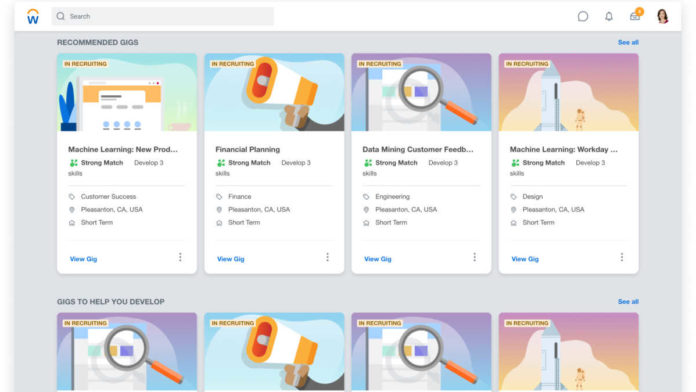
Workday opened up Workday Talent Marketplace, an employee mobility solution that helps workers uncover in-house opportunities when it’s time for a change. The company said the product will help organizations with their employee development and talent allocation efforts.
Talent Marketplace was created to “help customers navigate this changing world of work” by improving the way they redeploy and re-skill workers as business needs change, the company said.
.@Workday's new talent marketplace aims to create flexible workforces by encouraging employees to develop skills and find internal opportunities. #HR #HRTech Share on XThe marketplace helps link individual employees to opportunities within the organization. Using Workday’s machine-learning capabilities, the system compares a person’s skills and interests to the requirements of full-time, project and gig positions. It also uses Workday HCM data to create a “skills signature” for each worker, and can predict skills a worker might have even if they never entered that specific information.
Besides identifying candidates for specific positions or projects, those capabilities also help identify needs for additional training.
“People have far more capabilities than what they enter into a resume or CV,” said David Somers, Workday’s general manager, talent optimization. “Because our skills technology can infer related skills, customers have seen a dramatic increase in the number of skills attributed to their workers and enabled better discovery and recommendations for more targeted opportunity matching.”
Talent Marketplace as Talent Foundation
Workday said such capabilities can lead to the creation of a more flexible workforce. By helping companies use internal talent to address a variety of needs, and also to target reskilling and upskilling efforts, the system allows organizations to more readily adapt as business conditions change.
Employers are wrestling with such needs now, the company says, because the pandemic has led to surging demand in some areas and overcapacity in others. The Talent Marketplace’s capabilities can be used to examine the workforce’s skills inventory, develop the right mix of resources and build more agile cross-functional teams.
When companies can identify the skills it already has, and target learning in a way that helps employees build on their existing talents, they promote internal mobility and employee growth, Workday pointed out. With that in mind, the marketplace is designed to make personalized recommendations to encourage employee learning, and to encourage workers to take a proactive approach to their development.
For example, an employee interested in jumping from sales to marketing could use the system to find hands-on opportunities in the field, then go after internal gigs or projects that align with their career goals.
In September, Workday introduced new products aimed at improving an employer’s approach to diversity and inclusion. The first product, VIBE Central, offers content and reports that compile the state of a workforce’s diversity and representation. The second, VIBE Index, helps organizations measure and benchmark their D&I efforts.
Sign up for our newsletter here.
Image: Workday













